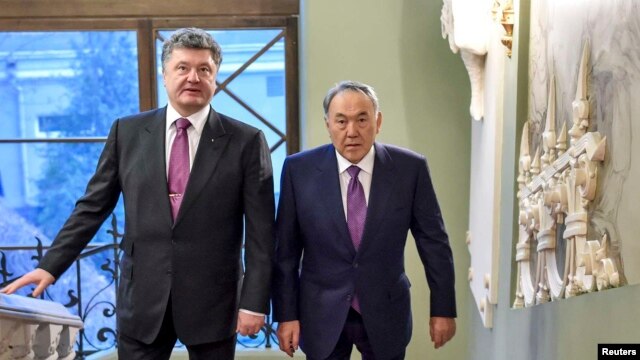Kazakh president calls for compromise between Russia, Ukraine
| Publisher | Radio Free Europe/Radio Liberty |
| Publication Date | 22 December 2014 |
| Cite as | Radio Free Europe/Radio Liberty, Kazakh president calls for compromise between Russia, Ukraine, 22 December 2014, available at: https://www.refworld.org/docid/54be1331e.html [accessed 19 May 2023] |
| Disclaimer | This is not a UNHCR publication. UNHCR is not responsible for, nor does it necessarily endorse, its content. Any views expressed are solely those of the author or publisher and do not necessarily reflect those of UNHCR, the United Nations or its Member States. |
December 22, 2014
By RFE/RL
 Ukrainian President Petro Poroshenko (left) and his Kazakh counterpart Nursultan Nazarbaev at their meeting in Kyiv on December 22.
Ukrainian President Petro Poroshenko (left) and his Kazakh counterpart Nursultan Nazarbaev at their meeting in Kyiv on December 22.
Kazakh President Nursultan Nazarbaev, during a visit to Kyiv, has reportedly called on Russia and Ukraine to seek compromise in order to end the conflict in eastern Ukraine and preserve its territorial integrity.
Nazarbaev's visit on December 22 also produced agreements on deliveries of Kazakh coal to Ukraine and the revival of a bilateral trade talks mechanism, as well as talk of defense industry cooperation – pointed messages to Moscow that Kazakhstan is unhappy with the conflict at the heart of the former Soviet Union.
"I am appealing to Russia and Ukraine to think about finding a compromise in order to get out of this conflict and preserve Ukraine's territorial integrity, because this situation is nonsense and should not be taking place," Nazarbaev said after talks with Ukrainian President Petro Poroshenko.
Nazarbaev's remark suggested he is concerned about the effects of the Ukraine crisis on Kazakhstan, which is a partner of Russia in trade and security groupings cultivated by President Vladimir Putin but is also pursuing close ties with the West.
Russia's ban on most Western food imports – part of its response to EU and U.S. sanctions imposed to punish the Kremlin for its interference in Ukraine – has led to trade disputes between Russia and Kazakhstan.
Nazarbaev said confrontation and sanctions were "a dead-end street."
He said that Kazakhstan and Ukraine had agreed on supplies of coal from the resource-rich Central Asian nation to Ukraine, which relies on Russian gas for about half its power and digs much of its own coal in regions now held by the pro-Russian rebels.
Poroshenko said that the countries would "revive our military-technical cooperation in full volume."
He did not give details, but suggested that meant Ukrainian defense enterprises helping Kazakhstan bolster its defenses rather than Kazakhstan supplying weapons to Ukraine, which is fighting the pro-Russian rebels in a conflict that has killed more than 4,700 people in eastern Ukraine since April.
The United States and the European Union have imposed sanctions on Russia over its annexation of Crimea from Ukraine and the conflict in eastern Ukraine, where the rebels have seized control of parts of two provinces with what Kyiv and NATO say is direct military support from Moscow.
The seizure of territory has caused concerns in Kazakhstan and other former Soviet republics that Moscow may have designs on their countries, particularly areas populated by ethnic Russians or Russian speakers.
Russia's isolation and tension with the West is also a source of concern for Kazakhstan because it is a partner of Russia and Belarus in a Customs Union that is to be transformed into a Eurasian Economic Union as of January 1.
Nazarbaev's visit came a day after Belarusian President Alyaksandr Lukashenko, whose country is one of Russia's few military allies, visited Kyiv and offered unspecified to help Ukraine.
Nazarbaev was due to meet Putin in Moscow later on December 22 and discuss several issues including Ukraine, Kremlin foreign policy aide Yury Ushakov said.
Separately, Ushakov said Putin would discuss efforts to convene new peace talks and the Ukraine conflict and in a telephone conversation later on December 22 with Poroshenko, German Chancellor Angela Merkel, and French President Francois Hollande.
More than 1,000 people have been killed in eastern Ukraine despite a September 5 deal on a cease-fire and steps toward peace, but fighting has abated this month and efforts have been made to hold new talks between representaives of Ukraine, Russia, the rebels, and the Organization for Security and Cooperation in Europe (OSCE).
With reporting by Interfax, TASS, RIA, and Unian
Link to original story on RFE/RL website
